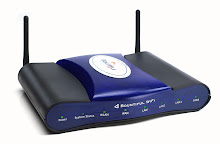Special Note: Make sure to tune in next month, where the discussion will continue on WiMAX, and how Bountiful Wi-Fi can help with the issues mentioned below.
The wireless industry keeps talking about "WiMAX." It's the newest craze in wireless technology, but it's not the only wireless solution. There's 3G (a wireless phone and Internet solution), but soon there's going to be 4G; there's also Wi-Fi, the big player in the wireless computer market.
There are several hurdles that WiMAX must jump over before it can be widely accepted and used. First, there are problems with laptops and desktop computers. Most are now equipped with Wi-Fi capabilities, which is NOT the same as WiMAX. Some say that WiMAX is Wi-Fi on steroids, which is pretty much false, because even if a person has a Wi-Fi card in their computer, they can't automatically get on a WiMAX network.
The phrase should be, "WiMAX is 'like' Wi-Fi on steroids"; it's like Wi-Fi in that it's wireless, but it's on a different signal, and the signal needs to be converted into a Wi-Fi band transmission before individual, Wi-Fi-enabled computers can use it.
Secondly, the door is wide open for new players to enter this market. Cellphones - they seem more favorable to 4G - and PCs - thoroughly grounded in Wi-Fi - don't seem super-enthused about the technology, so other groups (yet unknown) are free to come into this WiMAX space to take root.
The third strike against WiMAX is really the most powerful one, and it has to do with businesses. Will business owners be in favor of a nationwide wireless network that their employees can use anywhere? You would think the answer would be a resounding, “Yes!" Unfortunately for WiMAX, businesses like privacy, and there have been no mentions of security over a WiMAX network. The idea of the technology is for a widely broadcast, open network. Wi-Fi, on the other hand, has multiple encryption methods to protect users.
The Take-away
That's three strikes, WiMAX, but people are holding on to their dreams of nationwide wireless coverage. This year has been a critical developmental time for the idea of wide area coverage.
WiMAX may fail miserably for now, but may emerge as a viable solution in another three to five years. The country, right now, is too well-rooted in 3G and Wi-Fi as the preferred solutions for cellular phones and computers. The need for WiMAX is not where it needs to be; the solution is currently being covered well enough by the other two. It must offer a unique set of advantages before businesses will accept it as a standard.
Thursday, October 1, 2009
Subscribe to:
Posts (Atom)
![Reblog this post [with Zemanta]](http://img.zemanta.com/reblog_e.png?x-id=ef744c3c-fc27-48fd-a3b0-6098e408c121)





